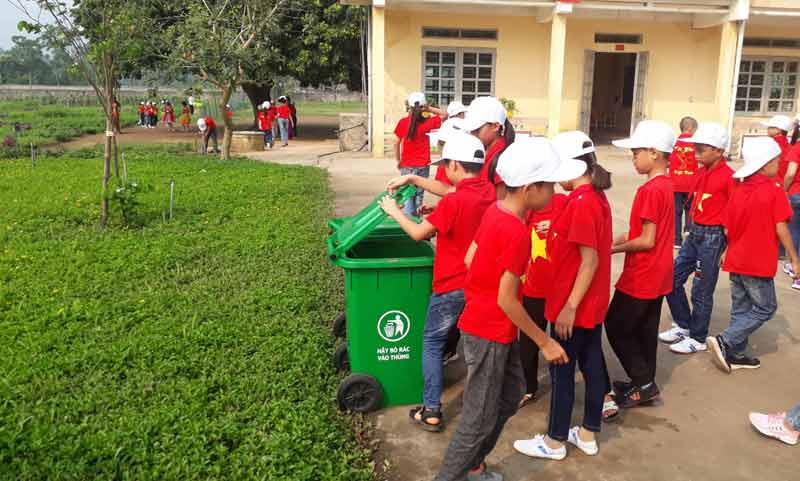
(HBO) - At Ngoc Luong Primary School A (Yen Thuy), the Department of Education and Training organized a conference to summarize the creative and innovative model for the primary level in the school of 2018 – 2019.
 The school students
are experiencing the educational activities associated with the environmental
protection at Ngoc Luong Primary School A (Yen Thuy).
The school students
are experiencing the educational activities associated with the environmental
protection at Ngoc Luong Primary School A (Yen Thuy).
According to the evaluation of the Department of Education
and Training, the primary schools in the province have actively selected from 1
to 2 contents suitable for the locality and the school to deploy, many schools
have registered 3 or 4 models in the school year of 2018 - 2019. Nine out of
the eleven districts have registered the model of innovation at the provincial
level and 31 out of the 230 ones have registered the model of innovation at the
district level, 230 out of 230 schools have registered the model of innovation
at the school level and school cluster. 100% of districts and the city have
organized good festivals for the primary students. All the activities have
focused on organizing experience activities associated with real life,
maintaining the local cultural identity.
The innovation movement at the primary level has contributed
to changing the awareness of the managers, the teachers, and the parents about
the education innovation, improving the capacity of the managers and the
teachers in managing, directing and organizing activities. The educational
activities in schools have been changed in an open, flexible, rich and lively
way. The school students have many opportunities to experience and have fun.
They like learning and they are allowed to learn so that they can apply the
knowledge in the real life. Therefore, the quality of education has positively
changed.
Hoa Binh province is undergoing a dynamic transformation amid Vietnam’s national digital transition. Building on Poliburo’s Resolution No. 57-NQ/TW on breakthroughs in science, technology, innovation, and national digital transformation, the province has rolled out a wide range of practical action plans. A standout initiative is the "Digital Literacy for All” movement, an effort to ensure that no one is left behind in the digital era.
Hoa Binh province is undergoing a dynamic transformation in the wake of the national digital transformation movement. Building on Resolution No. 57-NQ/TW of the Politburo on breakthroughs in science, technology, innovation, and national digital transformation, the province has implemented a wide range of practical action plans. A standout initiative is the "Digital Literacy for All” movement ambitious effort to ensure that no one is left behind in the digital age.
With a spirit of unity and proactive problem-solving, the Party Committee, the government and the people of Dong Lai Commune (Tan Lac District) have made great strides in implementing the resolutions of the 24th Party Congress of the commune for the 2020 - 2025 term. Focusing on leadership and practical actions, the commune has brought the Party’s resolutions into daily life, creating strong impacts and pushing the local development forward.
Amid the nationwide push for digital transformation, young people in Hoa Binh Province are stepping up as dynamic pioneers, applying technology to enhance Youth Union operations and expand the reach of youth-led initiatives. Through creativity and adaptability, Youth Union organizations at all levels have introduced a series of practical solutions, contributing to modern governance and community development.
In recent years, An Nghia commune, located in Lac Son district, has stepped up administrative reform, focusing on improving the quality and efficiency of its single-window service unit for receiving and processing administrative procedures. These improvements have helped create favourable conditions for local residents and organisations to handle administrative procedures, contributing to the commune’s broader socio-economic development.
The Prime Minister-approved master plan to develop the multi-use value of forests ecosystems through 2030, with a vision to 2050, aims to improve the management and sustainable use of forest resources, create jobs, increase incomes, and improve the living standards of ethnic minorities, people in mountainous and remote areas, forest workers and those living near forests.



 The school students
are experiencing the educational activities associated with the environmental
protection at Ngoc Luong Primary School A (Yen Thuy).
The school students
are experiencing the educational activities associated with the environmental
protection at Ngoc Luong Primary School A (Yen Thuy).